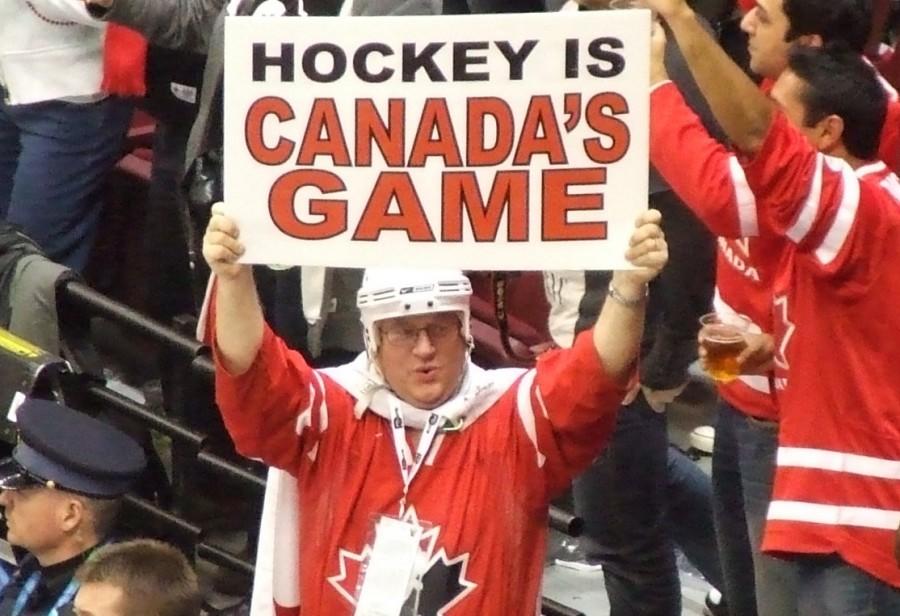True North Strong and…Not in the Playoffs?
This is the first time since 1970 that no team from Canada will compete in the Stanley Cup.
April 8, 2016
I’ve finally dried all the tears.
There ya have it, folks.
As of last week, it’s official: there will be no contingents from north of the border vying for Lord Stanley’s Mug when the playoffs begin on April 13. It will be the first time since 1970 that this has happened. It’s unsettling, disturbing and for this Canadian, simply heartbreaking. But what does it really mean? Any one franchise’s strength has little to do with their geographical location. It has to do with a combination of players, coaching staff and management, along with a certain je ne sais quoi. So is it really relevant for the media to declare this non-Canadian playoff situation like it’s the end of the world? Is it that dire of a situation? Is it because in a 30-team league, 14 teams get left out come playoff time and it just so happens that seven of them represent Canadian cities?
Let’s break down some numbers.
A Canadian franchise has not won the Stanley Cup since the Habs did it in 1993. I wasn’t even born. In my lifetime, which has been entirely spent as a Canadian, the Cup has not been in Canada. But the thing is, it has. I have seen the Cup in many capacities, as Canadian players from the winning team brought the Cup for hometown visits every summer — both Brendan Gallagher and Brent Seabrook went to my high school alma mater. The Cup has been in no way absent from Canada, even if it has been largely absent from its teams. Canadian success remains immensely prevalent in hockey across all fields, be it the Olympics, the World Championships, the World Juniors, and many other exciting tournaments and platforms.
Percentage-wise, the last four Cup winning rosters comprised of 62.5, 40.9, 60 and 48 percent Canadians, respectively. I would have included the last five, but that fifth one is still too real. Hockey love hurts. Anyway, the point is those rosters contained more Canadians than they did players from any other country. Their home bases may have been in Los Angeles and Chicago, but the players home bases were all-Canadian, all (or at least 41 percent) of the time.
In the leadership realm, of the teams with named captains, 11 are Canadian. Though Americans are close behind with seven captains, consider the fact that Canada has 10 percent the population that America does, and Canada still runs Hockeytown.
Further afield in recent international history, Canada has dominated. In the 21st century, Canada has taken three of four Olympic gold medals. It was an anomaly in Torino in 2006 when they finished an abysmal eighth, but on home ice in the best city in the world (can you guess where I’m from?), the Canadians took gold in dramatic and history-making fashion in 2010. Fast forward to Sochi where pressure was high for the Canadian squad to repeat on international-sized ice — something they’d never done before — and fend off a Russian team eager to claim the crown in their home rink. What ensued was more of a two-week exercise. Tournament best goaltender Carey Price let in just three goals en route to Canada’s golden defense. In the gold-medal game against Sweden, the Canadian bench could be seen celebrating before the clock had run out. An action that is typically a jinx in sports was accepted this time only, seeing as the 3-0 lead had been gained largely uncontested. The win was a much different one than that of four years prior, which was rich with dramatics.
And to go a step further, let’s take a look at the first overall draft picks dating back to 2000, where there were just six non-Canadians. And those nine Canadians aren’t just any old first overall picks. They include names like Sidney Crosby, Steven Stamkos, John Tavares, Taylor Hall and Connor McDavid, who will all go down in hockey history. Among the others’ contingent, the 2006 draft was when American Erik Johnson went first overall. I know, right?
The point is, that yes, it’s true. Seven of seven Canadian teams will be headed to the golf course early this summer, but that doesn’t mean Canadian hockey players as a collective will be. Jonathan Toews, Jamie Benn, Roberto Luongo and a metric ton of other universal-healthcare bearing millionaires will be representing the Great White North for their temporary American homes. Hockey is Canada’s game, and to anyone who says otherwise, I have five little words for you:
Canada will always be in the playoffs.
Email Rachel Ruecker at [email protected].
















































































































































